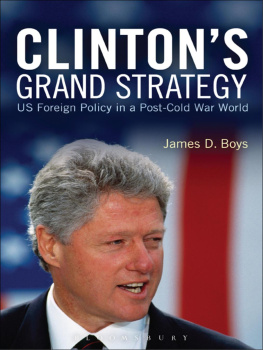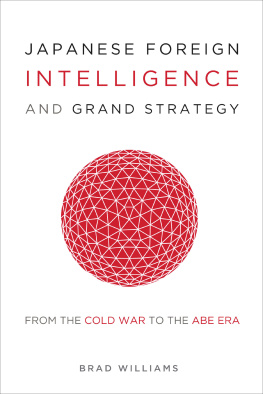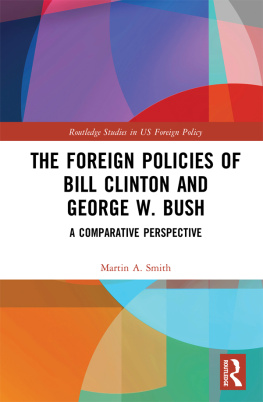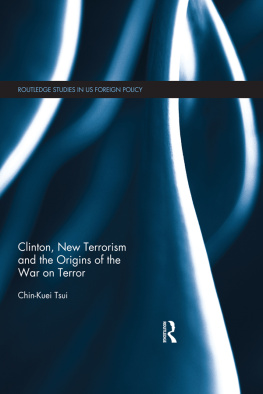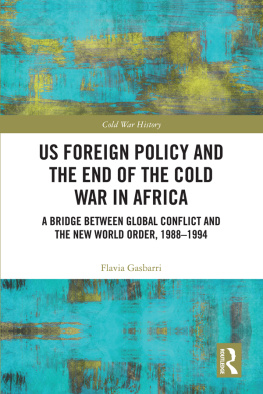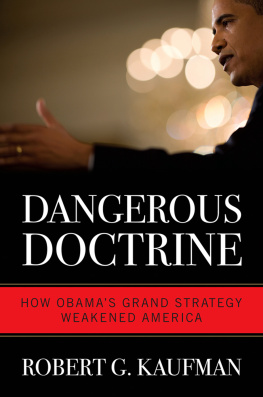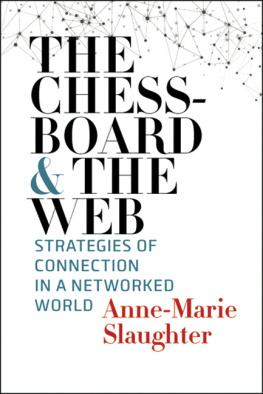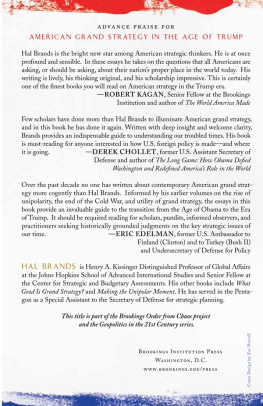This work is part of an ongoing research project into the Clinton administration that has so far spanned over two decades. My continuing work has brought me into contact with many former members of the Clinton administration, including the former president and vice president, providing insights and perspectives that have contributed directly to my writings and which continue to drive me into new areas of research. Several members of the Clinton administration were very generous with their time, and contributed greatly to this project; for this, they have my sincere thanks. This is particularly true in regard to Anthony Lake, Nancy Soderberg, Morton Halperin, Charles A. Kupchan, Leon Fuerth, as well as Robert Reich and Sidney Blumenthal. Thanks also to Stephen A. Smith, Clintons Chief of Staff from his days as Governor of Arkansas, and his wife Lindsley, who provided a fascinating insight into President Clintons formative years.
I am grateful for the assistance this project has received from so many in the international academic community: Thanks to my mentors on the journey to this point: Professor Scott Lucas of the University of Birmingham, Professor Robert McGeehan of the Institute of United States Studies, and David Waller of the University of Northampton. Thanks also to Dr Ian Jackson, formerly of De Montfort University, Professor Rob Singh of Birkbeck College, Professor Bruce Hoffman of Georgetown University, and Professor Gregory S. Gordon of the University of North Dakota for arranging my Visiting Fellowship in 2010. Thanks also to Professor John Dumbrell and Professor Philip Davies for their early career encouragement that led to teaching at the University of Leicester and De Montfort University, respectively. I particularly appreciate the assistance this project received from Richmond, The American International University in London.
I am very grateful for the many wonderful students that I have encountered over the years at a host of universities, particularly in my US Grand Strategy class, whose enthusiasm for this project has been most heartfelt. Seeing many of them graduate and achieve their ambitions, including working on Capitol Hill and at the White House, has been particularly gratifying. I am also most grateful to Professor Rory Miller for the pivotal role he played in securing my Visiting Senior Research Fellowship at Kings College, London.
I am grateful to the editors of several journals who have been supportive of my work and have seen fit to publish my research, much of which has fed directly or indirectly into this publication. Thanks in particular to Dr Jenel Virden, co-editor of the European Journal of American Studies, Professor Brian Gaines, editor of American Politics Research, and Dr Oz Hassan and Professor Jason Ralph, guest editors of the International Journal of Human Rights.
I am indebted to the kind support shown for this project by Sir Malcolm Rifkind, MP, who took time from his busy schedule as Chairman of the Intelligence and Security Committee to share his recollections of the Clinton administration from his time as UK Foreign Secretary and Defence Secretary under Prime Minister John Major. Thanks also to the members of the House of Commons Foreign Affairs Committee, particularly its Chairman, Sir Richard Ottaway MP, Rory Stewart MP, and Frank Roy MP for inviting me before their 2013 hearings on UK Government Foreign Policy Towards the United States, and for incorporating my findings into their final report.
Thanks also to the Cambridge Union and to Chatham House for their gracious invitations to speak on my research and related material. My thanks also for the support and encouragement this project has received from my friends and contacts at Sky News, the BBC, Al Jazeera English, and Monocle 24. I am particularly grateful to J. F. O. McAllister for his recollections as White House Correspondent at Time.
At Bloomsbury, my great thanks to Caroline Wintersgill for her faith in this project and for shepherding it through all stages of its development, as well as to her colleagues, Mark Richardson and Jyoti Basuita.
On a personal note, many thanks for the help, encouragement, and support I have received from my many friends, particularly Robert and Nicki Bannister, Chris Capece, Stuart, and Jayne Bannister and Rob Jones. I am particularly grateful to my parents, Roger and Pauleen, without whose initial support none of this would have been possible. Thanks also to lifelong family friends Chris and Liz Roper and to my in-laws, Jonathon and Carol, for their support and encouragement these years.
Finally, and most importantly, thanks to my wonderful wife, Carly, whose devotion and support were instrumental in ensuring that this project not only saw the light of day, but was also able to be completed on schedule. She has my eternal thanks and I gladly dedicate this endeavor to her.
Why study the Clinton administration and its grand strategy initiative? In the years since it left office, tumultuous events have occurred that suggest its time in power belongs in a previous era. The attacks of September 11 (9/11), wars in Iraq and Afghanistan, as well as domestic clashes over healthcare and the economy raise doubts about the continued relevance of Clintons time in office and imply that if the end of the Cold War marked The End of History, then perhaps 9/11 constituted its recommencement. Those who lament President Clintons apparent disengagement with foreign affairs and the supposed absence of a discernable Clinton Doctrine exacerbate this sentiment. In their view, there is all too little to study and too few reasons to do so, except perhaps as a cautionary tale. Such views, however, are fundamentally flawed.

